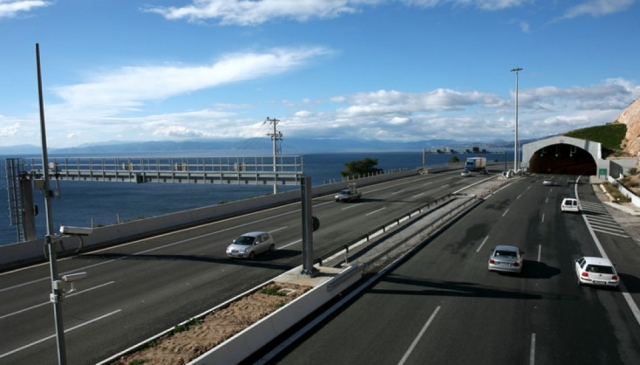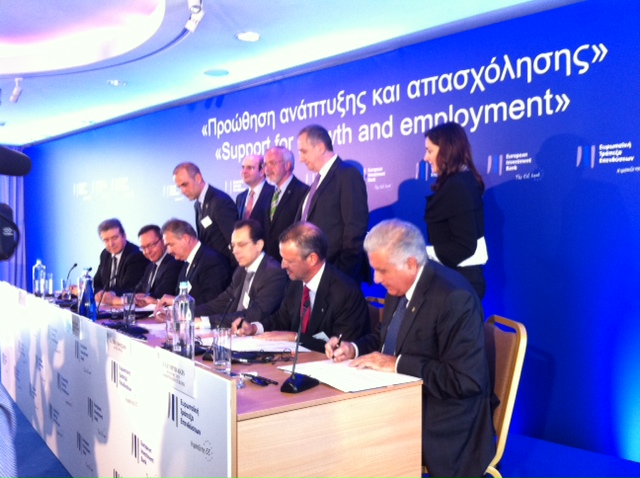Anastasia Balezdrova
The European Investment Bank and the Greek government have signed agreements for the provision of development loans amounting to more than half a billion euro. The money is intended for the resumption of the construction of highways, for the construction of local infrastructure and the financing of small and medium-sized enterprises. For the first time in its history, the Bank is taking measures to address the pressing problem of unemployment in Greece which, according to the latest data, has reached 27%.
The four agreements were signed at a ceremony in Athens attended by Greece’s Minister of Finance Yiannis Stournaras, Minister of the Interior Yiannis Mihelakis, Minister of Development Kostis Hatzidakis and Minister of Competitiveness, Infrastructure, Transport and Networks, Michalis Chrysochoidis. The European Investment Bank was represented by its president Werner Hoyer.
The sum of 550 million euro will be allocated as follows:
350 million euro for the resumption of the interrupted, due to the crisis, construction of the main thoroughfare in the country, namely Patras - Athens - Thessaloniki. The loan will finance the construction of a new highway, 239 km long, and the improvement of 434 km of existing sections of the same main road axis.

50 million euro will be allocated to the state fund for deposits and loans. "These funds will be transferred as direct funding to the municipalities which will be able to use them for transportation needs, improvement of the road network, educational infrastructure, for the protection of cultural and historical heritage, repair of public buildings, environmental protection, energy needs and tourism infrastructure," said Minister of the Interior Yiannis Mihelakis.
The remaining 150 million euro will be allocated to two banks, namely Alpha Bank and the Cooperative Bank in Crete. "We will use the 100 million euro for the financing of companies in the fields of industry, tourism and services. We will give priority to those which export their products abroad," said the general manager of the bank, Artemis Theodoridis. He added that the reduction in the cost of labour has improved the business environment in Greece but the bureaucratic obstacles are still posing significant problems. In his opinion, another obstacle to the development of small- and medium-sized enterprises is the high cost of lending in the country which is several times higher than that in northern European countries.
"We have been cooperating with the European Investment Bank since 2007. The total value of the loan agreements signed is to the amount of 125 million euro. 110 million of them have already been injected into the market. Our goal is, by the end the year, to allocate the remaining 15 million euro," said the head of the Cooperative Bank in Crete, Ioannis Lembidakis. He pointed out that 78% of the bank's shares belong to small- and medium-sized companies, mainly from Crete. "The favourable conditions for the granting of loans have significantly contributed towards the improvement of the economy of the island."
Lembidakis pointed out that sustainable companies in the field of tourism, energy, and production and marketing of food products would be able to use the 50 million euro which are to be allocated to the bank.

Within the context of the specific cooperation the European Investment Bank will implement the Youth Employment Pilot Programme, to be launched for the first time in Greece. The aim of the programme is to tackle youth unemployment and it will finance small- and medium-sized enterprises operating in the industry, trade and tourism services, which meet the following conditions:
- To have employed at least one young person over the past six months or to plan to hire one within that same period from the date of signing the contract with the bank.
- To provide professional training or opportunities for obtaining an internship or training for young people.
- To collaborate with technical schools, colleges and universities by providing jobs for young people, for example, during the summer internship programmes.
The Ministers of Finance and Development supported the initiative of the European Investment Bank. Yiannis Stournaras pointed out that the future borrowings will be used to finance small- and medium-sized enterprises in the areas of health, education and energy.
According to the Minister of Development, Kostis Hatzidakis, the 550 million euro will partially solve the problem of liquidity of the Greek companies. He described as important the role of the European Investment Bank. "By the end of the year we will have used 635 million euro and 805 million euro will remain to be spent in 2014."
Hatzidakis emphasized the effectiveness of the Trade finance system of the European Investment Bank, involving Greece’s three major banks. "It guarantees the bank guarantees of the commercial banks in Greece worth about 500 million euro and may be renewed up to three times a year."